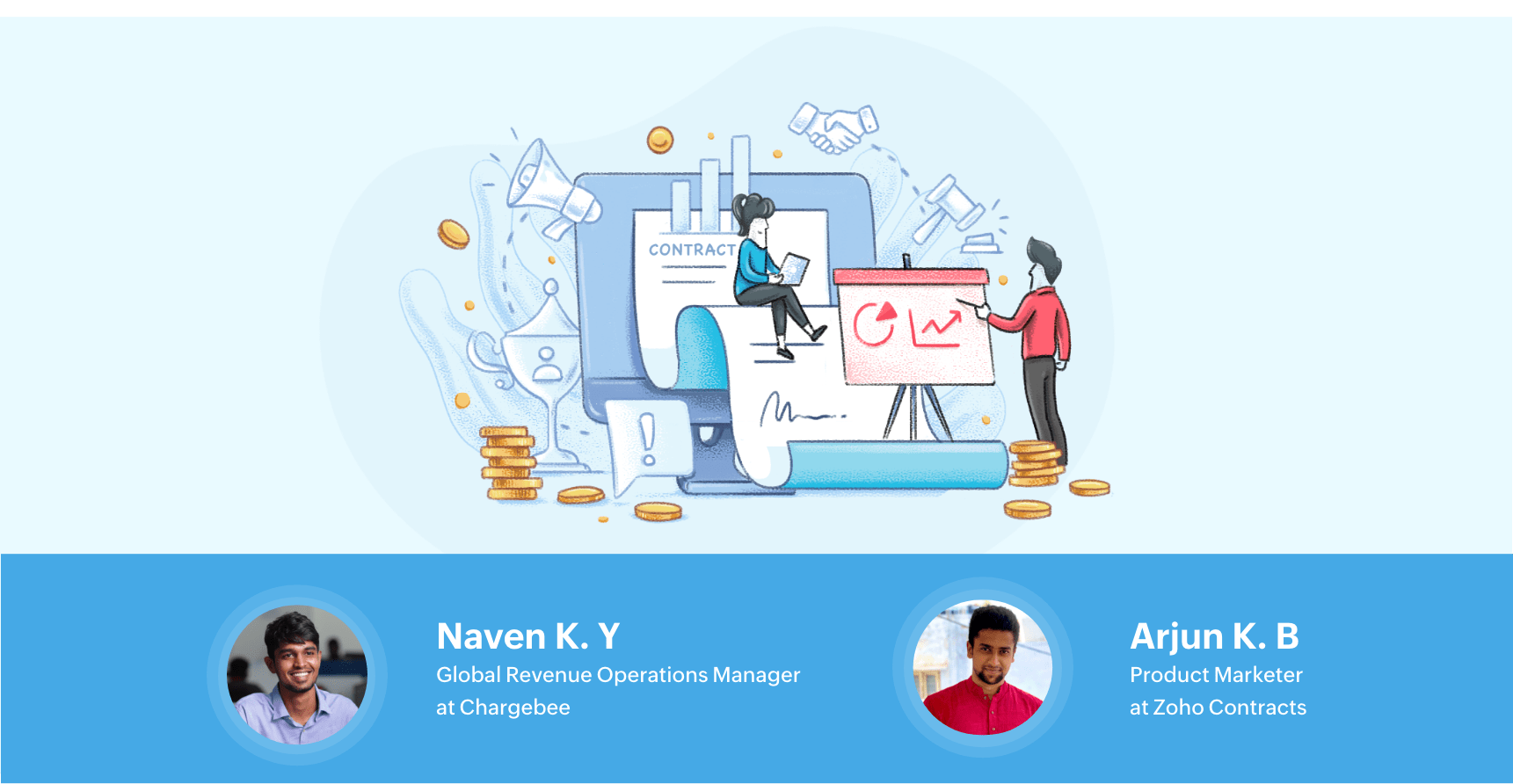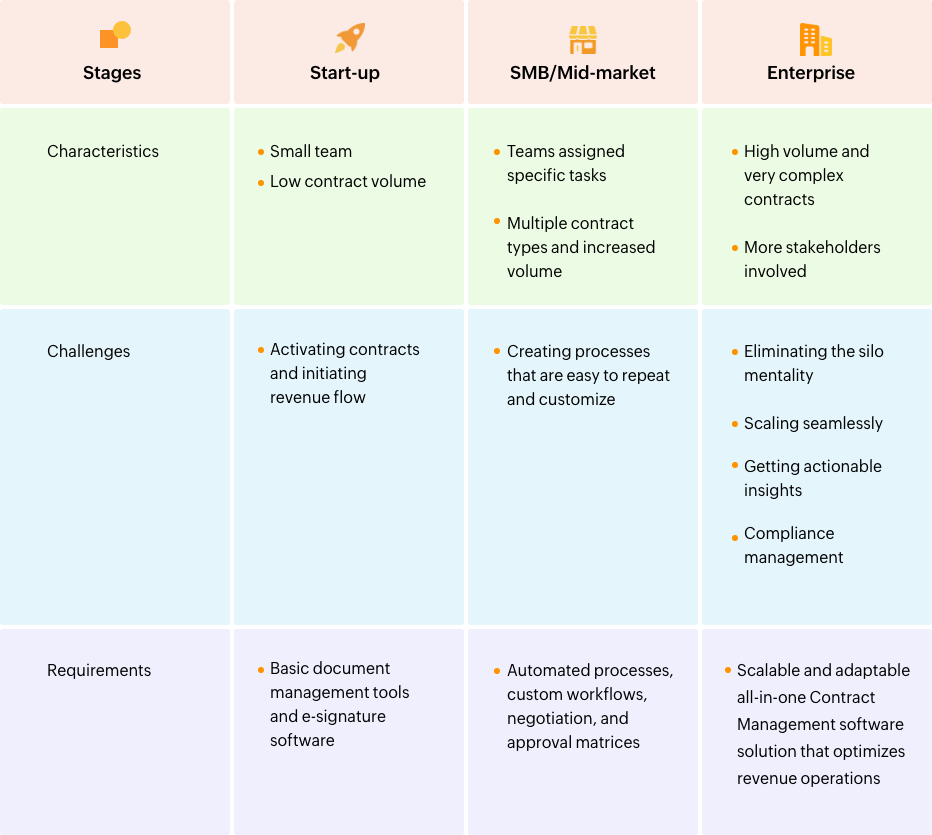- HOME
- Expert Talks
- Contract management challenges in revenue operations and how to overcome them
Contract management challenges in revenue operations and how to overcome them
- Last Updated : May 28, 2024
- 1.9K Views
- 7 Min Read

Revenue growth is one of the most critical indicators of the health of a business. Yet, as a company grows and more people come on board, work is organized based on functions and the revenue-first mindset slowly wanes. A recent study by Forbes has identified that nearly two-thirds (64.80%) of a sales rep's time, on average, is spent in non-revenue generating activities. This trend necessitates a revenue operations team that works alongside other departments to ensure greater financial health for your growing business. With their scope of visibility spanning across the functional boundaries of multiple teams, they can act with a single-pointed focus on revenue, and contract management will be a huge part of this focus.
Every dollar that enters a business is essentially governed by a contract. Contracts have multiple touchpoints across different departments, and the efficiency of the contract lifecycle process directly impacts sales cycle times. In this blog, we dive deep into the impact of contract management on revenue operations.
Arjun K. B., Product Marketer at Zoho Contracts, had an opportunity to discuss the various challenges of contract management in revenue operations with Naven K. Y., Global Revenue Operations Manager at Chargebee. Naven is a part of the core team at Chargebee that was responsible for scaling their revenue 30x in four years. Naven has seen his organization grow from a start-up to an enterprise, and here, he shares the contract management challenges they had to overcome during this journey.
Start-up phase
During the company's initial stages, getting into business agreements became vital to initiate a strong revenue inflow. The team was small, and contracts were executed with simple resources like document management software and an e-signature workflow. "When we were a ten-member team, we'd all get excited when we reached the contract stage of a deal. The sales, compliance, and legal teams then get together to ensure the contract happens," said Naven.
SMB/Mid-market phase
The organization saw an increase in the volume of the contracts when it grew to an SMB and then a mid-market enterprise. The revenue operations system needed to be capable enough to cater to repetitive activities like negotiating terms, redlining, and taking on additional tasks necessary for the contract lifecycle.
The SMB phase is an ideal time for an organization to start the process of automation. It brings much-needed efficiency to the contract management process for handling workflows, approvals, obligations, and signatures. Also, at this stage, having a central contract repository that provides better visibility for all departments becomes essential. Without it, accessing critical contract information and retrieving contracts on demand can become a hassle.
Enterprise phase
In the enterprise phase, the contract management dynamics change drastically. "Suddenly, we were not only dealing with large volumes but also with the increased complexity of contracts," Naven observed. When a company deals with multiple enterprise customers, it becomes a challenge to cater to every customer's demands. As the company's size increases, they also need to ensure the different functions don't work in silos. At this phase, dedicated points of contact across functions and appropriate channels to enable seamless communication should be established.
Another challenge is to manage large volumes of data that need to be dealt with. This necessitates a system that will give you actionable insights from the data; while ensuring that all your customer's data is safe. A dedicated contract management software solution will help create an ecosystem that will react swiftly to these changes and be flexible enough to accommodate the high volume and complexity of the contracts.

Overcoming contract management challenges
A revenue operations team is primarily responsible for aiding cross-functional collaborations. Fragmented and disconnected systems hamper smooth communication across the various departments of your business, resulting in inefficient contract management. Communicating through chat or email would work in a start-up ecosystem. As your company scales to mid-market, you would need the help of an automated contract management solution to deal with the growing volume of customers.
When your company grows further to the enterprise level, you'll be dealing with high-stakes customers, potentially from large enterprises of their own. This is when it's essential to build an ecosystem that provides greater visibility into the entire contract management process and equips your departments with all the resources required to act. To ensure compliance and mitigate risk, your legal team needs to be aware of a client's points of contact, their industry vertical and business model, the size of their business, their demands, and the contractual changes that need to be enacted. It is difficult and time-consuming to store and track this data manually. A comprehensive contract management software solution is unavoidable at this stage.
Revenue-optimizing opportunities in contract management
If you address these problems related to scaling in an intuitive way, you'll end up creating a system that is naturally more flexible because it was designed to grow with you from the start. This flexibility will help you transform the challenges above into competitive advantages. From this standpoint, there are many opportunities in contract management, as described below.
Pricing
Businesses nowadays are exceptionally price-sensitive, and many vendors provide custom pricing as a result. This means that when a deal reaches the contract stage, the probability of closure is very high. But still, business deals are lost even this far down the sales cycle due to pricing issues.
"The key is to identify the right pricing that provides value for money to the customer while improving revenue performance of the business and knowing how to communicate it in a contract," said Naven. With a scalable contract management solution, there is ample scope to explore the relationship between the pricing communicated to customers and the success of a deal. "After all, how do you figure out what is the most successful pricing scheme?" Naven emphasized.
Obligations management and renewals
All the customizations you had promised to the customers from product, compliance, legal, and data standpoints need to be fulfilled, but managing obligations doesn't stop after creating, maintaining, or renewing contracts. It also matters while terminating the contract. "Some customers would want us to erase their data within 48 hours of terminating the contract, for example. It's difficult to commit to such demands because securing the data is a huge challenge," remarked Naven.
You may also consider renewal as an expansion opportunity. Renewals can be regarded as the lowest hanging fruit when it comes to revenue, but it still requires a system that would give you proactive notifications for tracking renewal dates and obligations at the enterprise level. The system should also notify you from a compliance standpoint. "You need to have all the data that will help you in critical situations, such as downtimes. The system must tell me 'these are the customers you need to inform in the next 30 minutes because you have committed to that in the contract,'" Naven stated.
Change management
Change management is another critical aspect of contract management. When your company goes global, multiple versions of your contracts evolve. There would be separate versions for specific geographies like Europe, North America, and MEA, and the laws will keep changing. "Having Google drive folders for 200 versions of the same contract is not solving for scale. It is just redundant work," Naven reflected.
"I should have a system that tells me that this particular version of the contract has gone through 150 iterations. And out of those 150 iterations, clause 16.2 C has been changed by 80 customers. Then, I could check its relevance and make the necessary changes," he continued.
To address both the problems above, the contract management system you choose should have flexible templates where the clause language can be selected, replaced, or added as per your requirements. As Naven put it, "I should be able to tell the customer that this is the main vetted version of the contract, and these are the other versions that they could choose. These little things improve the buying experience during the sales cycle." It's vital that you lay down the foundations of optimizing the contract to manage change in its initial stages of growth for smoother scaling.
The way forward
"I intend to make the customer experience as delightful as possible throughout their journey," stated Naven. Contract management should not be a bottleneck for the account executive. The ease of collaboration between different departments to finalize a contract should be seamless. Having a single platform for all your contract management processes allows you to track activities, generate insights, and scale as you need to.
"Creating a flexible ecosystem should be the fundamental philosophy because it's this flexibility that leads to scalability," remarked Naven. The system should work irrespective of the process changes you create or the number of software integrations you make. It should also not be affected by the changes in the teams or departments.
Naven ended by saying, "Improving your revenue operations is always a work in progress. Contract management has a considerable role to play here, and the future in this space looks exciting."
As many businesses rebuild and scale in a post-pandemic economy, the emphasis on digital tools for efficient contract management will only increase. Check out our blog post on the benefits of contract management software in overcoming the challenges in contract management to learn more. If you're looking for an end-to-end contract management solution for your growing organization, we encourage you to sign up for afree demo of Zoho Contracts where we'll help assess your individual needs and suggest the best way forward to optimize your revenue operations for 2022.
 Akhilraj
AkhilrajAkhilraj is a writer based in Chennai, India.